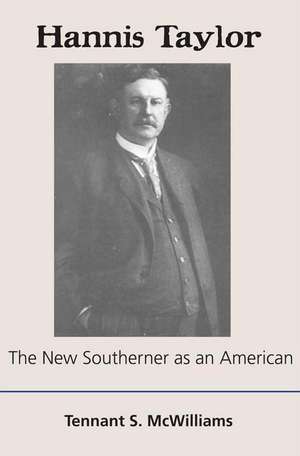Hannis Taylor: The New Southerner as an American
Autor Dr. Tennant McWilliamsen Limba Engleză Paperback – 16 sep 2006
How a proponent of the New South creed could move easily to advocate the nationalistic foreign and domestic policies often associated with Theodore Roosevelt
During the late nineteenth and early twentieth centuries, American life took on contradictions that were later to surface with considerable poignancy. While many publicists and politicians foresaw an America of harmony and great opportunity, they also clung tenaciously to such doctrines as Anglo-Saxon racial superiority and the righteousness of liberal capitalism-notions that worked to defeat the progress they espoused. Here is a study of one of those persons, Hannis Taylor.
For a number of reasons Taylor’s life is uniquely useful for the historian interested in the paradoxes of American life at the turn of the century. Unlike many others of the era who have been examined through biography, Taylor pursued the multifaceted career of practicing attorney, constitutional historian, journalist, diplomat, and ever-aspiring politician. Hence he had occasion to write and speak on almost every intellectual and popular issue of the period. His record serves as a microcosm of many of the contradictions spanning American thought during that time. Further, Taylor was a Southerner. Before moving to Washington, D.C. in 1902, Taylor had grown up in a North Carolina torn by the Civil War and had taken an active role in Alabama affairs during the three decades following Reconstruction. His life shows how a proponent of the New South creed could move easily to advocate the nationalistic foreign and domestic policies often associated with Theodore Roosevelt. Finally, from a humanistic standpoint Taylor's life permits a study in human strivings for achievement. American historiography gravitates to the successful; here is an account of a more common stereotype, the man who worked relentlessly at becoming a noted American by supporting popular causes and who failed tragically.
During the late nineteenth and early twentieth centuries, American life took on contradictions that were later to surface with considerable poignancy. While many publicists and politicians foresaw an America of harmony and great opportunity, they also clung tenaciously to such doctrines as Anglo-Saxon racial superiority and the righteousness of liberal capitalism-notions that worked to defeat the progress they espoused. Here is a study of one of those persons, Hannis Taylor.
For a number of reasons Taylor’s life is uniquely useful for the historian interested in the paradoxes of American life at the turn of the century. Unlike many others of the era who have been examined through biography, Taylor pursued the multifaceted career of practicing attorney, constitutional historian, journalist, diplomat, and ever-aspiring politician. Hence he had occasion to write and speak on almost every intellectual and popular issue of the period. His record serves as a microcosm of many of the contradictions spanning American thought during that time. Further, Taylor was a Southerner. Before moving to Washington, D.C. in 1902, Taylor had grown up in a North Carolina torn by the Civil War and had taken an active role in Alabama affairs during the three decades following Reconstruction. His life shows how a proponent of the New South creed could move easily to advocate the nationalistic foreign and domestic policies often associated with Theodore Roosevelt. Finally, from a humanistic standpoint Taylor's life permits a study in human strivings for achievement. American historiography gravitates to the successful; here is an account of a more common stereotype, the man who worked relentlessly at becoming a noted American by supporting popular causes and who failed tragically.
Preț: 222.46 lei
Nou
Puncte Express: 334
Preț estimativ în valută:
42.58€ • 46.27$ • 35.79£
42.58€ • 46.27$ • 35.79£
Carte indisponibilă temporar
Doresc să fiu notificat când acest titlu va fi disponibil:
Se trimite...
Preluare comenzi: 021 569.72.76
Specificații
ISBN-13: 9780817353759
ISBN-10: 0817353755
Pagini: 192
Dimensiuni: 140 x 216 x 13 mm
Greutate: 0.23 kg
Ediția:First Edition, First Edition
Editura: University Of Alabama Press
Colecția University Alabama Press
ISBN-10: 0817353755
Pagini: 192
Dimensiuni: 140 x 216 x 13 mm
Greutate: 0.23 kg
Ediția:First Edition, First Edition
Editura: University Of Alabama Press
Colecția University Alabama Press
Notă biografică
Tennant McWilliams, a native Alabaman with experiences along Mobile Bay’s eastern shore dating back to the 1940s, is a retired university administrator and an unretired historian. He and his wife, Susan, live in Fairhope, Alabama.
Recenzii
“Hannis Taylor (1851-1922) was a Mobile lawyer, author of books on constitutional history and other legal treatises, U.S. Minister to Madrid during the second Cleveland administration, a spread-eagle imperialist, candidate for Congress, a Republican convert and friend of Theodore Roosevelt, and finally a Washington attorney. . . . Taylor was a model 'New South' optimist and exemplar of Southern progressivism's preoccupation with race and governmental efficiency. . . . Meticulous . . . the organization of the book is sensible, the prose simple and clear.”
—American Historical Review
“McWilliams presents Taylor as an example of how personal aspirations and commitment to national ideals could keep southerners from learning from their experiences with tragedy by developing insights into the social and economic paradoxes of the New South and nationalism. . . . A sound, well-researched biography that effectively places Taylor in his times.”
—Journal of American History
—American Historical Review
“McWilliams presents Taylor as an example of how personal aspirations and commitment to national ideals could keep southerners from learning from their experiences with tragedy by developing insights into the social and economic paradoxes of the New South and nationalism. . . . A sound, well-researched biography that effectively places Taylor in his times.”
—Journal of American History
Descriere
How a proponent of the New South creed could move easily to advocate the nationalistic foreign and domestic policies often associated with Theodore Roosevelt
